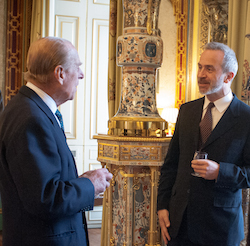| |
|
 |
How the Royal Family makes conservation cool
January 10, 2015:
 |
 |
 |
HRH Prince Philip talks to TNC's Peter Wheeler about the links between religions and conservation, at Buckingham Palace, December 2014 PHOTO: ARC/Katia Marsh |
Waiting for delayed flights after meeting Prince William and his wife Kate Middleton – in the US to promote wildlife conservation – The Nature Conservancy's Peter Wheeler reflects in a blog about how the British Royal Family makes conservation cool and about what he saw in his visit to Buckingham Palace earlier this month to celebrate ARC's 20th year and TNC's new partnership with ARC.
The story comes in the same week that we learn that Chinese Buddhists have passed an official ban on wildlife killing: China being one of the most critical markets for wild animal parts from Africa and Asia.
Extract from Peter Wheeler's blog
 |
| "The Duke of Edinburgh’s brilliance was that he saw that what was urgently needed between diverse faith groups and scientists was not to try to reach a consensus and issue a common plan, but rather let each faith express its convictions and determine actions separately, but after listening to others and sharing their views and insights with all participants." |
|
 |
 |
"As we waited for delayed flights in winter traffic from Washington to New York, I had time to reflect on how amazing it is that the monarchy in my home country has successfully made conservation one of their core commitments over multiple generations. Even in the modern era in which the monarch is often relegated to a figurehead, conservation is one area where they are exhibiting extraordinarily high value to the rest of us. And there is one theme to their approach in particular that the environmental movement can learn from."
In 1986, HRH Prince Philip, Duke of Edinburgh – Prince William’s 93-year-old grandfather – personally convened, for the first time, the Assisi Symposium of leaders of five of the world’s leading Faith groups to explore what they could collectively do to stem the decline in the natural world – leading to the Assisi Declaration. Interestingly, he still tells the story of how he was rejected by the conservation establishment at least three times when he proposed this, before eventually getting his way.
The Duke of Edinburgh’s brilliance was that he saw that what was urgently needed between diverse faith groups and scientists was not to try to reach a consensus and issue a common plan, but rather let each faith express its convictions and determine actions separately, but after listening to others and sharing their views and insights with all participants.
Nine years later, a convening organization called the Alliance of Religions and Conservation (ARC) was formed. By following this same flexible and inclusive model, ARC has been responsible for a number of environmental successes, including protecting threatened wildlife.
 |
 |
 |
African elephants - under increasing threat from poachers |
In 2012, in partnership with ARC, 50 African religious leaders pledged to counter the illegal wildlife trade through awareness raising and action. In 2014, the Indonesian Council of Ulama (MUI) issued the first ever fatwa (edict) for the environment, requiring the country’s over 200 million Muslims to protect threatened species. This is a powerful statement that will have a major impact in a country home to rhinos, tigers and elephants.
This general principle of joining in diversity, is now (after the false starts of many previous meetings) being recognized as a key organizing principle for the UN climate change meeting (COP20) in Lima, which draws to a close this week. As the world’s governments prepare for what could potentially be a major breakthrough on addressing global emissions at next year’s meeting in Paris, an increasing number of countries, not the least of which is China, appear to be closer to taking on their own national actions – and accept that they’ll be different from country to country – in our broader shared fight to mitigate climate change.
Read the whole blog by Peter Wheeler.
Links
ARC's 20th year celebration at Buckingham Palace in December 2014
ARC partnership with the Nature Conservancy (TNC)
Interview with HRH The Prince Philip on religion and conservation
Prince Charles on wildlife and Islam
Chinese Buddhist ban on killing wildlife
Chinese Daoist ban on killing wildlife
The Nature Conservancy
|
 |
 |
|
|
|
|
|
 |
December 23, 2014:
Landmark decision by Chinese Buddhists to ban killing wildlife
The China Buddhist Association has issued a landmark declaration calling all Buddhist followers to “Protect Life with Compassion and Mercy-Release Appropriately”.
|
 |
January 10, 2015:
How the Royal Family makes conservation cool
Waiting for delayed flights after meeting Prince William and Kate Middleton – in the US to promote wildlife conservation – The Nature Conservancy's Peter Wheeler reflects in a blog about how the British Royal Family makes conservation cool. |
 |
Interview with Prince Philip
“If you believe in God, which is what Christians are supposed to do, then you should feel a responsibility to care for His Creation.” ARC's founder, the Duke of Edinburgh gives a rare interview about his beliefs in conservation. |
 |
 |
|
|

